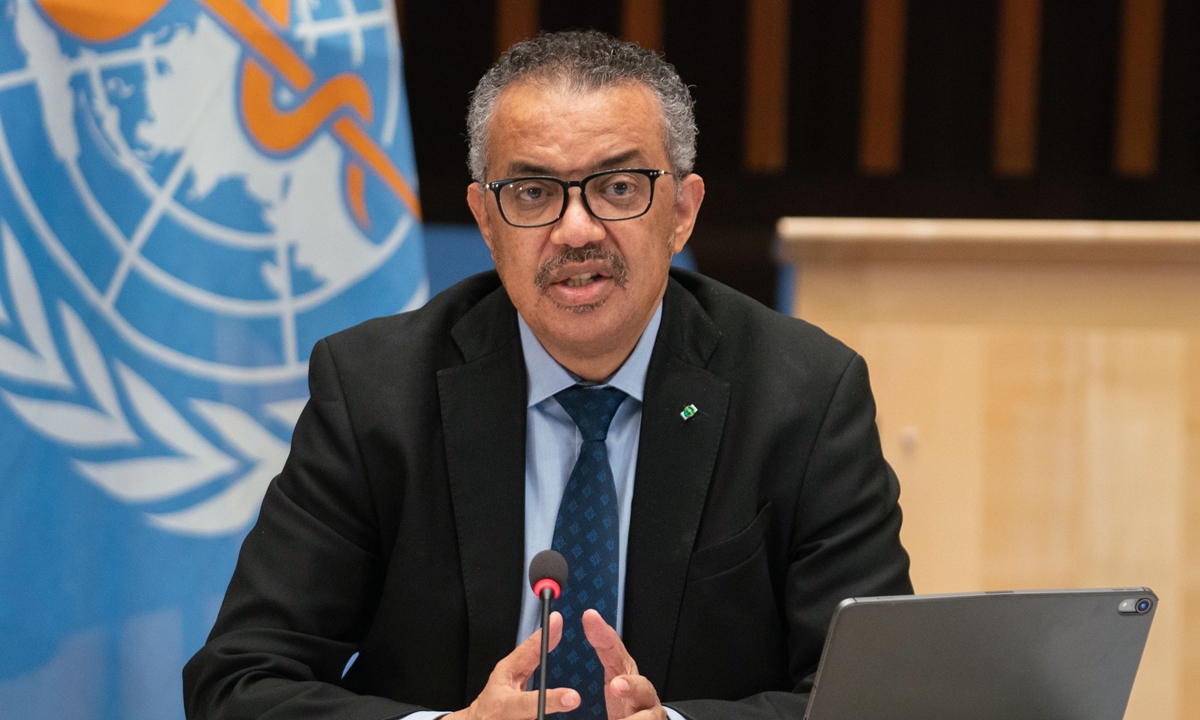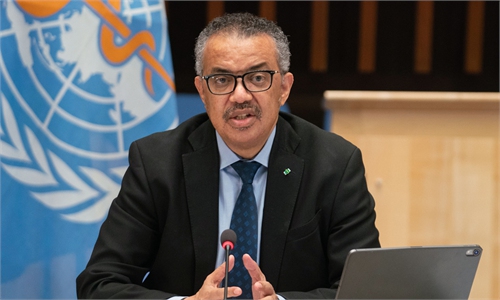Tedros’ remarks on China’s zero-COVID ‘irresponsible’
Comment fails to reflect WHO's evaluation of nation’s anti-virus effort

WHO Director-General Tedros Adhanom Ghebreyesus. Photo: VCG
World Health Organization Director-General Tedros Adhanom Ghebreyesus' remarks that China's zero-COVID strategy is "unsustainable" was seen by Chinese experts as "irresponsible" comment on the Chinese people's efforts in fighting the pandemic and failed to reflect his, or WHO's, sufficient evaluation of China's efforts in this area. They urged the official to further elaborate on his remarks to avoid an unnecessary negative influence on the effect, approach and global contribution of China's antivirus work.Epidemiologists further explained that China's zero-COVID strategy is not rigid as it changes with the situation. And it is the most suitable strategy for China to curb viral infections, said those health experts, noting that after the strategy bought time, China will ramp up efforts to prepare for a possible exit.
In a briefing on Tuesday, Tedros called on China to rethink its zero-COVID strategy, saying the approach no longer makes sense as the Omicron variant spreads through populations and the country's economy suffers.
"We don't think that it is sustainable, considering the behavior of the virus now and what we anticipate in the future," Tedros said, adding that transiting to another strategy will be very important. "We have discussed this issue with Chinese experts and we indicated that the approach will not be sustainable considering the behavior of the virus. I think a shift will be very important."
Tedros' remarks came after Reuters reporters asked WHO to comment on China's zero-COVID strategy, asking whether it is a "good or bad policy" at this stage of the pandemic.
The comment from the WHO head, however, failed to grasp a full and accurate evaluation of China's fight against COVID-19, and such remarks, coming from a person in his position, is irresponsible for the 1.4 billion people's effort in fighting the coronavirus, an expert from the Institute of International Relations at the China Foreign Affairs University in Beijing, who asked anonymity, told the Global Times.
He also suspected whether Tedros' judgment has been swayed by overwhelmingly distorted reports in the Western media of the predicament Shanghai is facing when battling COVID-19. "It is also possible that some Western media, such as Reuters, deliberately shuffled the question to Tedros, to undermine the global contribution of China's COVID-19 fight, ahead of a US-organized global COVID summit," said the expert, urging the WHO head to further elaborate his remarks.
In response to Tedros' remarks, Zhao Lijian, spokesperson of China's Ministry of Foreign affairs, said at a Wednesday briefing that "we hope relevant people can view China's anti-COVID policies in a rational and objective way, learn more facts and avoid making irresponsible remarks."
Zhao further explained that China's zero-COVID policy is not to seek zero infections, but rather to curtail the viral transmission in the shortest time span, which provided a powerful guarantee for people's health and lives, and also effectively protected vulnerable groups, such as aged population.
He said that China's continuous tweaking of the strategy is to protect lives at a maximum level, and China is confident to win the battle against COVID-19, to make greater contributions to the global fight against the pandemic.
Most suitable strategy
The WHO head's judgment also sparked heated discussions among epidemiologists focused on China's COVID-19 control, who believe such remarks were made because of his limited understanding of the evolving zero-COVID strategy, and Tedros, or the WHO, should further clarify such remarks to avoid unnecessary misunderstandings of China's anti-virus strategy.
Tedros made such a "reminder" for China regarding zero-COVID because his knowledge on this strategy is limited, while China has made timely adjustments of this policy when the situation is different, Zeng Guang, former chief epidemiologist of China's Centers for Disease Control and Prevention (CDC), told the Global Times on Wednesday.
The health expert noted that the zero-COVID strategy is what suits China best right now, and buys time for the country to prepare for the future exit of the pandemic.
It [WHO] should further clarify what "not sustainable" means. For example, how long will it not be sustainable? Chen Xi, an associate professor of public health at Yale University, told the Global Times. He noted that the current dynamic zero-COVID policy is necessary because it offers a window of opportunity for China to get ready, Chen noted. "For example, in the next half year, China should enhance mass vaccinations particularly among elderly people and those with underlying diseases, and also allocate medical resources to increase the effectiveness of ICUs," he said.
Those views were echoed by Jin Dongyan, a biomedical professor at the University of Hong Kong, who told the Global Times that the policy is not everlasting. Those unvaccinated aged group are exposed to great risks, and it is urgent for the government to offer protection for this group, said Jin.
Epidemiologists pointed out that China's zero-COVID strategy has been refined from the initial elimination of all infections, to the current dynamic zero-COVID, which focuses mainly on staunch viral infections outside of quarantined areas.
At the same conference with Tedros, Mike Ryan, the WHO's emergencies director, also said that "We need to balance the control measures against the impact on society, the impact they have on the economy, and that's not always an easy calibration," he said.
Ryan also noted that China has registered a relatively low death toll, compared with 1 million in the US and more than 500,000 in India. With that in mind, it is understandable, Ryan said, that one of the world's most populous countries would want to take tough measures to curb coronavirus contagion.
A life-saving method
One day before Tedros made such remarks, a peer-reviewed study, published by the journal Nature Medicine, said that China risks a "tsunami" of coronavirus infections resulting in 1.55 million deaths if the government abandons its long-held Covid Zero policy and allows the highly-infectious Omicron variant to spread unchecked.
Without COVID-19 restrictions such as mass-testing drives and reducing human interactions, the spread of Omicron could lead to 5.08 million hospital admissions, 2.67 million people in ICUs and 1.55 million deaths, with the major wave occurring between May and July, read a handout of the paper sent to the Global Times by Yu Hongjie from the School of Public Health of Fudan University, who co-authored the paper.
Yu said that the unvaccinated population aged above 60 years old will account for 74.7 percent of the deaths triggered by COVID-19, if China scraps its antivirus restrictions.
The expert from China Foreign Affairs University also said that Tedros and WHO never directly chided some Western countries, when they failed to control the outbreak in their countries, which has led to millions of deaths.
In the US, the death toll has topped 1 million, with 75 percent of people who have died of the virus 65 or older. One in every 100 older Americans has died from the virus, US media reported.
"China's zero-COVID strategy, which prioritizes protecting lives, will prove the Western countries' hasty re-opening is not the only way out of this pandemic, and such effort should be respected," said the expert.




